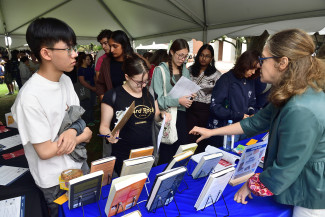
Johns Hopkins UniversityEst. 1876
America’s First Research University
Mobilizing Democracy: from Dictatorship to Neoliberalism
Guest Post by Paul Almeida
My first encounter with Central America came in the late 1980s when I volunteered with a local immigration agency. Northern California’s Monsignor Oscar A. Romero Central American Refugee Committee (MOARC) aided refugees, most of whom were fleeing El Salvador’s decade-long civil war. While a volunteer, I had the opportunity to travel to El Salvador as hostilities were winding down in one of the final conflicts of the Cold War. Once in the country, I vividly recall hearing the term “neoliberalism” for the first time as I sat in a press conference held by El Salvador’s leading labor umbrella organization while heavily armed state security forces waited outside. The unions criticized the new political party that had recently taken power for aggressively shrinking the public sector and an already feeble welfare state. Though the labor union speeches left a strong impression on me as a young adult (I was twenty-two years old), I failed at the time to realize both the significance of this new seemingly jargon-laden term, “neoliberalism,” and the historically transformative moment. Nonetheless, the experience would mark my scholarly trajectory for the next twenty-plus years.
The overly zealous military surveillance of the peaceful labor union press conference represented the state repression suffered by much of Central America in the twentieth century. “Neoliberalism” would symbolize the future economic path forward for the isthmus as the region transitioned to democratic forms of governance. My first book, Waves of Protest: Popular Struggle in El Salvador, largely focused on explaining the mobilizations against dictatorship and authoritarianism that characterized so much of the past history of Latin America. In the late 1990s and early 2000s, as I spent my time deeply entrenched in the archives of Salvadoran libraries collecting materials to complete this first book (often in basements and floors below ground level), major nonviolent street protests were erupting above ground over the implementation of a whole new species of economic measures, especially privatization of the public sector and infrastructure. The activists on the streets grouped these economic measures together into what they called el neoliberalismo. A noticeable shift also occurred in the political graffiti on the walls of the cities and towns from “abajo la dictadura” and “no más desaparecidos” to “no a la privatización.”
I soon discovered from press reports and my travels to Guatemala, Nicaragua, and Costa Rica that these types of citizen protests against el neoliberalismo were not only breaking out in El Salvador, but also throughout Central America as international financial institutions and local political and economic elites exceedingly placed pressure on governments to reduce state and social welfare investments. By the mid-2000s, several nations witnessed the largest popular demonstrations in their recent histories over issues related to economic liberalization such as privatization, free trade, and labor flexibility laws. Multiple demonstrations of over 100,000 people took place over privatization of health care, social security, telecommunications, and energy in Costa Rica, El Salvador, and Panama. Between 2003 and 2007, major national level protests occurred in Costa Rica, El Salvador, and Guatemala over free trade. At this same time, much of the national territory of Honduras and Nicaragua became engulfed in mobilizations against the privatization of water and sewage services. Not only were these dramatic protest demonstrations massive in size, they also incorporated several social sectors from civil society such as students, public sector employees, unions, women’s groups, NGOs, oppositional political parties, and environmentalists. If the twentieth century battle in Central America centered on liberating people from authoritarian regimes, then clearly the fault-line in the early twenty-first century appears to be over free market reforms and the pace of economic globalization.
Since so much scholarly and mass media attention had been given to these types of economic conflicts in South America, especially the cases of Argentina, Bolivia, and Ecuador, I set out on a mission to document and explain the distribution of these anti-neoliberal campaigns in Central America. After another decade of gathering archival data and conducting over forty interviews with the key protagonists leading the protest campaigns during field research in all six Central American countries, my second book, Mobilizing Democracy: Globalization and Citizen Protest, was born.
While the breakdown of state-supported economies has conditioned the course of Central American nations for more than three decades and driven the defensive mobilizations highlighted in Mobilizing Democracy, a number of other outcomes related to neoliberalism are just as deserving of future scholarship. With poverty rates in the region hovering between 30 and 70 percent and near majorities working in the precarious informal sector of the economy, the alarming levels of societal violence and mass immigration out of northern Central America could also be approached and better understood from empirically tracing the severe social displacement and economic exclusion from the orthodox implementation of neoliberal policies. Such an undertaking may well assist in explaining, and potentially addressing, the current “push factors” compelling tens of thousands of children and young mothers from Central America to risk the perils of migrating over land to the United States.
Paul Almeida is an associate professor of sociology and interim chair of the graduate group in social sciences at the University of California, Merced. He is the author of Mobilizing Democracy: Globalization and Citizen Protest.


